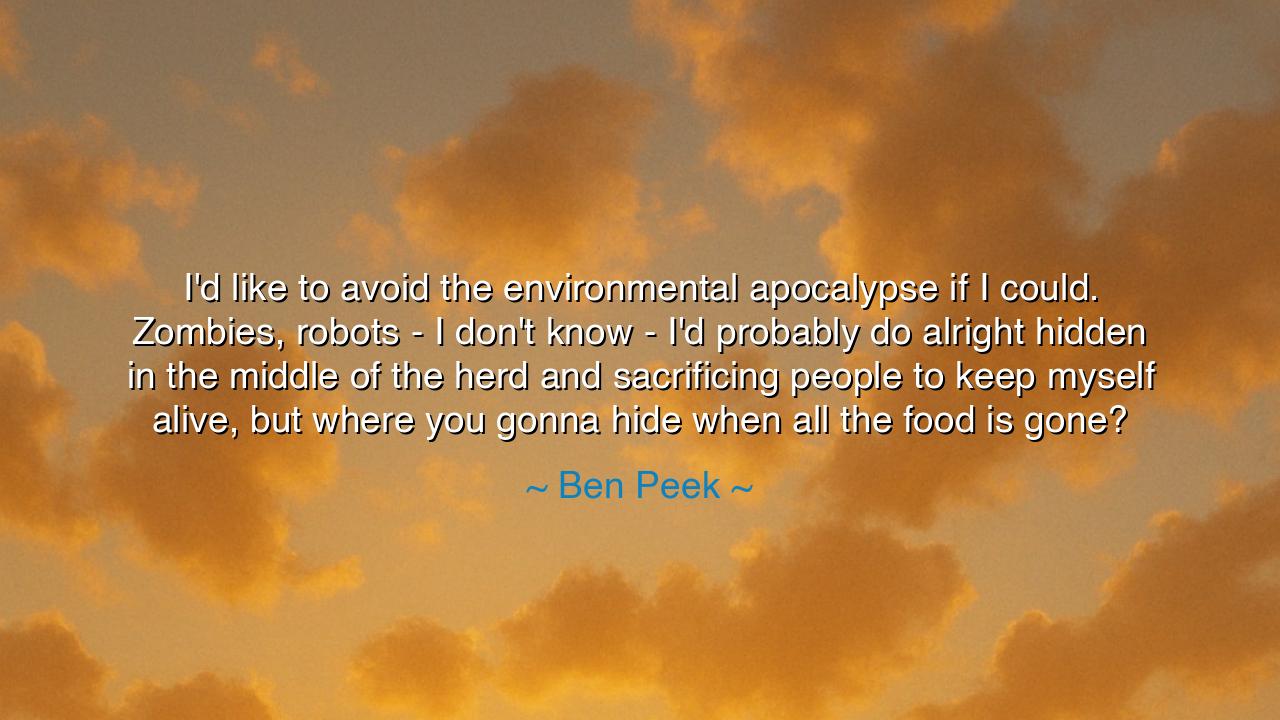
I'd like to avoid the environmental apocalypse if I could.
I'd like to avoid the environmental apocalypse if I could. Zombies, robots - I don't know - I'd probably do alright hidden in the middle of the herd and sacrificing people to keep myself alive, but where you gonna hide when all the food is gone?






Hear the strange yet piercing words of Ben Peek, who cloaks truth in jest and satire: “I'd like to avoid the environmental apocalypse if I could. Zombies, robots—I don't know—I’d probably do alright hidden in the middle of the herd and sacrificing people to keep myself alive, but where you gonna hide when all the food is gone?” At first, his words may draw laughter, for he invokes the fantasy of zombies and robots, the stuff of tales and nightmares. Yet beneath the humor lies a warning as sharp as iron: of all the apocalypses mankind may imagine, none is as real and as merciless as the one we bring upon ourselves through the ruin of the environment.
The meaning is plain when the mask of jest is lifted. Against zombies, one may run; against robots, one may hide or fight. But when the earth itself grows barren, when fields no longer yield and waters no longer nourish, there is no refuge. “Where you gonna hide when all the food is gone?” This question is not rhetorical—it is a dagger aimed at the conscience of our age. It reminds us that while we amuse ourselves with fantasies of destruction, we stand on the edge of a true apocalypse, slow and silent, yet more terrible than any fiction.
History bears grim testimony. Consider the Dust Bowl of the 1930s in America, when careless farming practices and drought stripped the land of its fertility. Crops failed, families starved, and hundreds of thousands fled in desperation. No zombie horde chased them, no army of machines rose against them—only the failure of the soil, brought about by human neglect, reduced them to wandering exiles in their own land. Peek’s words echo this ancient truth: when the earth withdraws her gifts, no fortress, no weapon, no wit can save us.
The apocalypse of the environment is unlike all others, because it strikes at the root of life itself. Food, water, air—these are the foundations of every society. Remove them, and the proud towers of civilization crumble into dust. Against armies we can resist, against plagues we can fight, but when the harvest is gone, when the seas rise and the soil withers, survival itself becomes impossible. The jest of hiding in the herd becomes a bitter truth: in desperation, men will turn on one another, sacrificing brother and neighbor for one more day of life.
Peek’s words carry also a challenge to our moral imagination. It is easy to imagine fighting monsters or machines, for these enemies are clear and external. It is far harder to face the truth that the true threat is ourselves, our greed, our waste, our blindness to the future. We are both the builders of civilization and its potential destroyers. To jest of zombies is to laugh at shadows, but to face environmental collapse is to confront the uncomfortable reality of human responsibility.
The lesson, then, is one of vigilance and courage: do not be lulled by fantasy when reality itself is crying out. The environmental apocalypse can be avoided, but only if we act with foresight, restraint, and reverence for the earth. We must tend the soil, preserve the waters, and temper our hunger for consumption, lest the banquet of plenty vanish into famine. Every act of conservation, every choice to heal rather than exploit, becomes a shield against the true apocalypse.
Therefore, beloved listener, take these words to heart: when the myths of zombies and robots fade, the world will still face the question, “Where will you hide when all the food is gone?” Answer it not with despair, but with action. Plant where there is emptiness, restore where there is ruin, and live with the humility of one who knows the earth sustains us all. In this way, Peek’s jest becomes prophecy fulfilled not in doom, but in renewal. Avoid the apocalypse—by building a future where food, water, and life itself are never lost.






AAdministratorAdministrator
Welcome, honored guests. Please leave a comment, we will respond soon